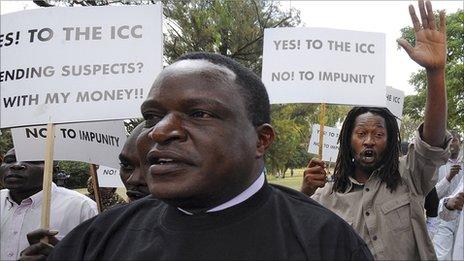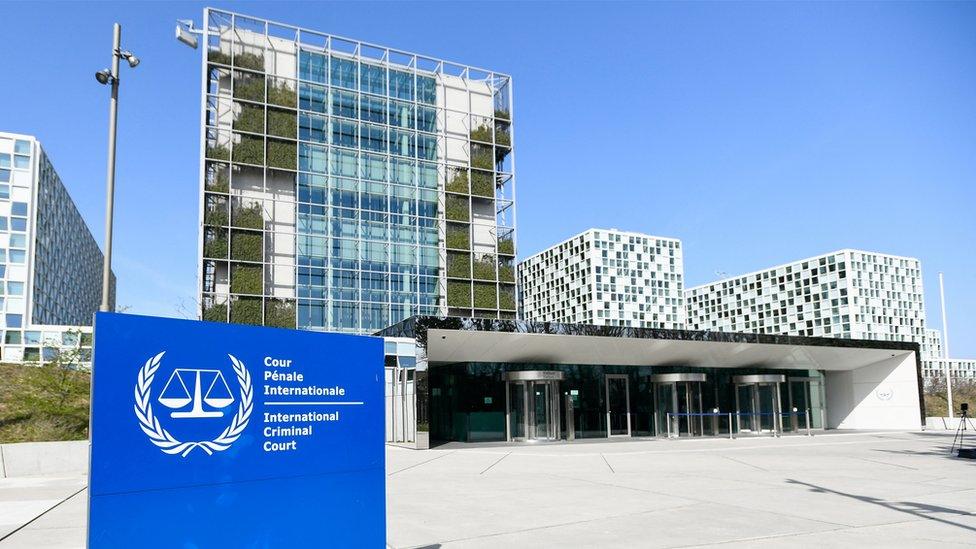Who gains from Kenya's ICC cases?
- Published

According to opinion polls, Kenyans support the ICC’s push to punish the perceived perpetrators
Six Kenyan politicians accused of links to the violence which followed the 2007 elections are to appear at the International Criminal Court in The Hague. Some Kenyans have been lobbying for the case to be deferred. As Kenyan analyst Gitau Warigi writes for the BBC Focus on Africa magazine, this has more do to with politics than justice
The ICC tug-of-war has provoked another savage bout of infighting within Kenya's shaky coalition government.
The Kibaki wing of the coalition, the Party of National Unity (PNU), is spearheading the deferral campaign and has even instigated a motion in parliament to have Kenya withdraw entirely from the Rome Statute, the treaty that underpins the ICC.
President Mwai Kibaki is entirely fixated with the predicament of Deputy Prime Minister Uhuru Kenyatta, the son of independence leader, Jomo Kenyatta.
He is also worried about the case of his closest confidante Francis Muthaura, a secretary to the cabinet and that of the former police commissioner, Hussein Ali.
The case against these three is that they organised retaliatory attacks against the initial perpetrators of the massacres. Overall, the violence left 1,200 people dead and more than 500,000 homeless.
The rival Orange Democratic Movement (ODM) faction, led by Prime Minister Raila Odinga, is pulling in the opposite direction and has insisted the country's obligations to the Rome Statute be upheld.
Justice unserved
Whatever the debate, this is in fact about politics rather than justice and it is threatening to destroy the political settlement that ended Kenya's post-election crisis.
Mr Kenyatta and William Ruto, the former higher education minister who has also been summoned to The Hague, have been saying they will be candidates in the 2012 presidential election when Mr Kibaki's tenure comes to an end.
An indictment by the ICC would almost certainly end these ambitions.
The foremost beneficiary would be Mr Odinga, already being prejudged by opinion polls as the 2012 presidential frontrunner. Yet the ICC matter is hurting the ODM leader almost as much.
It has intensified the long-running feud between Mr Odinga and Mr Ruto.
Those who are backing Mr Ruto have been driven into a marriage of convenience with the PNU, and specifically Mr Kenyatta, with the sole intention of stopping the prime minister's political ambitions dead in their tracks.
Improbable as it sounds, a whispering campaign that Mr Odinga somehow wrote the list of targets for Mr Ocampo, is spreading among both Mr Kenyatta's and Mr Ruto's core supporters.
The other silent beneficiary of the ICC ruckus is Vice-President Kalonzo Musyoka, but he has opted to play his cards more tactfully than his bitter foe Mr Odinga. With an eye on 2012, he has deliberately chosen to be the face of the government's anti-ICC campaign.
By doing this Mr Musyoka is making a critical investment, drawing on potential supporters in the areas that Mr Kenyatta and Mr Ruto control.
The expectation is that he will reap the rewards come election time. If indeed the ICC was to put Mr Kenyatta and Mr Ruto out of political circulation, then Mr Musyoka may be looked upon kindly for his efforts.
So far, the question of his sincerity is being delicately side-stepped.
What is beyond doubt is that if this previously implausible alliance between Mr Kenyatta, Mr Ruto and Mr Musyoka ends up fronting a joint candidate - who the vice-president fervently hopes will be himself - the numbers they can call up would easily overwhelm Mr Odinga.
Already, that is apparent in parliament where the ODM's dominance has been eroded with the defection of Mr Ruto's allies.
Political backfire
The person who could end up paying the highest price over the ICC imbroglio is Mr Kibaki himself. He is the person whom victims of the violence look to for restitution and justice.
Mr Kibaki's uncharacteristically unsubtle campaign to forestall any ICC trials has left the victims pained and disillusioned.
More so as they see the president hobnobbing with characters like Mr Ruto in whose area most of the violence and destruction was carried out.
Meanwhile, the ICC business remains unfinished, with Mr Ocampo suggesting that the court's decision on indictments could come very soon.
Kenya's lobbying has gone a notch higher to target UN Security Council members. However, there is no guarantee the council will heed Kenya's and the AU's deferral request.
Under ICC rules, a deferral is allowed if a state party guarantees that it has established a credible and independent judicial process to try the crimes in question.
The state party must also demonstrate that it is singularly committed to prosecuting those crimes.
Kenya has yet to demonstrate a commitment on either front.
If anything, attempts to create a special tribunal to try the cases arising from the post-election mayhem have failed twice in the Kenyan parliament.
Gitau Warigi is a political columnist with the Sunday Nation newspaper , externaland an online editor with africareview.com, external
- Published15 December 2010
- Published15 December 2010
- Published7 January 2015
- Published15 December 2010
- Published7 February

- Published27 August 2010